Piedras Negras
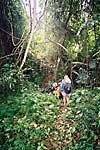 It
is forty kilometers downriver from Yaxchilán to Piedras Negras.
It, too, was a great city-state during the height of the Mayan civilization,
more specifically the Classic and Late Classic Periods. It was know as
y-okib (yo-ki-bi) meaning "Great Entrance" or "Gateway".
It is commonly believed to refer to a large cenote found nearby. Its sculpture
and artistry are considered some of the finest in the Mundo Maya. For
more information, see the Foundation
for the Advancement of Mesoamerican Studies, Inc and the Center
for the History of Ancient American Art and Culture.
It
is forty kilometers downriver from Yaxchilán to Piedras Negras.
It, too, was a great city-state during the height of the Mayan civilization,
more specifically the Classic and Late Classic Periods. It was know as
y-okib (yo-ki-bi) meaning "Great Entrance" or "Gateway".
It is commonly believed to refer to a large cenote found nearby. Its sculpture
and artistry are considered some of the finest in the Mundo Maya. For
more information, see the Foundation
for the Advancement of Mesoamerican Studies, Inc and the Center
for the History of Ancient American Art and Culture.
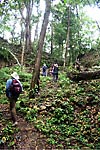 From
the control point or entrance on the river, it is an half-hour trek through
the jungle of the Guatemalan National Park of the Sierra
del Lacandón. Piedras Negras is in Guatemala. It is far more
remote than Yaxchilán, accessible only by river. It took us two
and a half days to paddle to it.
From
the control point or entrance on the river, it is an half-hour trek through
the jungle of the Guatemalan National Park of the Sierra
del Lacandón. Piedras Negras is in Guatemala. It is far more
remote than Yaxchilán, accessible only by river. It took us two
and a half days to paddle to it.
It had rained a bit that morning, so the forest glissened but the air
was not very heavy. This is truely rainforest. The site is for the most
part unexcavated. Until recently it had not been visited by archaeologists
for almost fifty years. 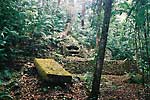 Yet it is a major site. In fact, it may yield answers to many questions
about the ancient Maya. What excavations that have been conducted reveal
the burning of buildings in the city and the selective destruction of
the monuments, suggesting that the destroyers were literate enough to
leave certain glyphs and sculptures untouched. Apparantly, they had specific
targets: rival kings and not the gods.
Yet it is a major site. In fact, it may yield answers to many questions
about the ancient Maya. What excavations that have been conducted reveal
the burning of buildings in the city and the selective destruction of
the monuments, suggesting that the destroyers were literate enough to
leave certain glyphs and sculptures untouched. Apparantly, they had specific
targets: rival kings and not the gods.
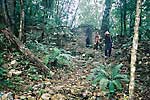 These
are tanatalizing clues that may shed light on the collapse not only of
Piedras Negras but also the entire Classic Mayan civilization just before
the end of the first millenium. We spent a number of hours exploring without
knowing too much until the two caretakers for the area came. We passed
their control point on our way to the site but they were off somewhere
else. They explained what it was we were looking at, including showing
us the well-known and rare sweatbath construction and the massive jaguar
head thought to represent the ruler of one of the rulers of the city.
These
are tanatalizing clues that may shed light on the collapse not only of
Piedras Negras but also the entire Classic Mayan civilization just before
the end of the first millenium. We spent a number of hours exploring without
knowing too much until the two caretakers for the area came. We passed
their control point on our way to the site but they were off somewhere
else. They explained what it was we were looking at, including showing
us the well-known and rare sweatbath construction and the massive jaguar
head thought to represent the ruler of one of the rulers of the city.
What made the visit different was the gravesite of Tatiana
Proskouriakoff, at the highest point of the ancient city, that. Tatiana
began as an artist who ultimately was able to decipher a good part of
Mayan Heiroglyphic writings. Previously these were thought to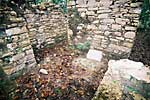 be nothing more than philosophical musings on nature and astronomy but
Tatiana was able to show without question that they were, in fact, geneaologies
and histories of the rulers and inportant people and events.
be nothing more than philosophical musings on nature and astronomy but
Tatiana was able to show without question that they were, in fact, geneaologies
and histories of the rulers and inportant people and events.
It was clear that we were just the most recent arrivals of the "pilgrimage" to visit her remains. In the cracks of the stone walls surrounding her grave were inserted bits of pottery shards and other small artifacts, no doubt, in her memory and honor.
It was here, too, that we got our closest look at the ubiquitous monkeys. They were no more than 20 feet above us. They were shaking the limbs and branches of the trees with both their hands and feet. And they were throwing loose branches down at us as though they were guarding the gravesite and trying to get us to leave to keep the grave peacefully undisturbed.
We continued through the site. I thought we were going still deeper into
the jungle only to realize shortly that we had actually arrived at a bend
of the river somewhat upriver from where we entered the ruins. What's
more, our liason, Willie, was waiting for us with a motorized launch 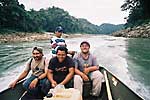 to
get us back to the main control point. It was on this short hop that our
pilot pointed out three crocodiles at three different places en route
-- one was some two meters in length. Needless to say we were constantly
looking to see more for the rest of the trip. Unfortunately there were
none to be seen. Perhaps it was actually a fortunate thing -- I for one
didn't want to end up a meal for a crocodile I didn't even know. From
here it was off to the dramatic waterfalls of Busiljá.
to
get us back to the main control point. It was on this short hop that our
pilot pointed out three crocodiles at three different places en route
-- one was some two meters in length. Needless to say we were constantly
looking to see more for the rest of the trip. Unfortunately there were
none to be seen. Perhaps it was actually a fortunate thing -- I for one
didn't want to end up a meal for a crocodile I didn't even know. From
here it was off to the dramatic waterfalls of Busiljá.